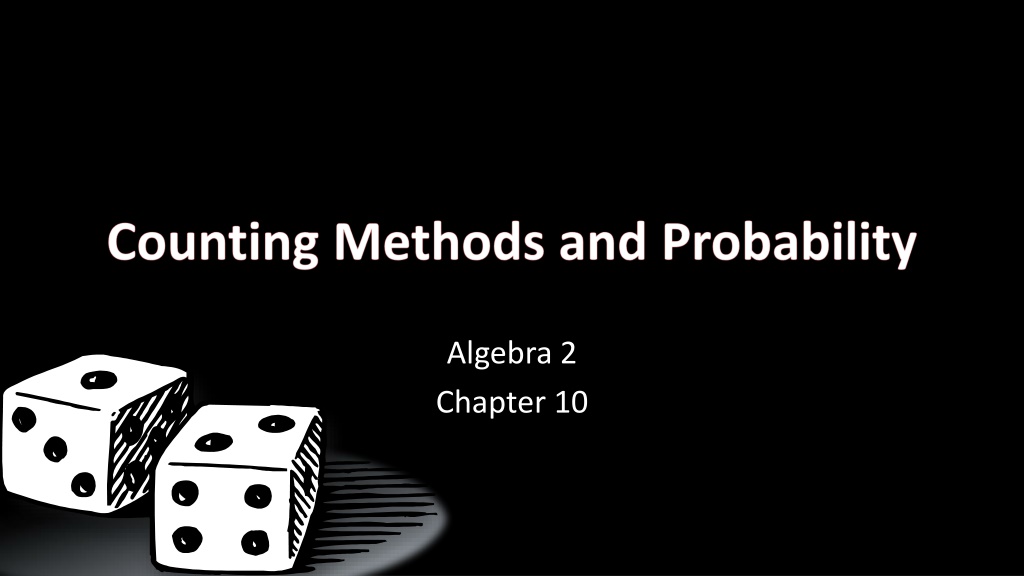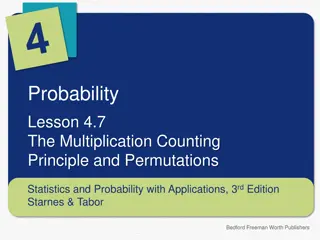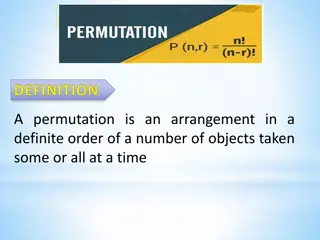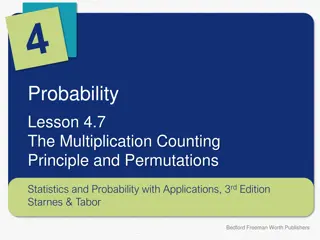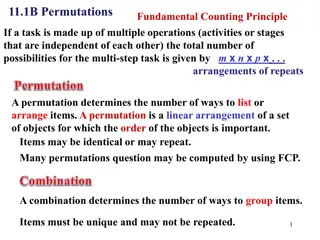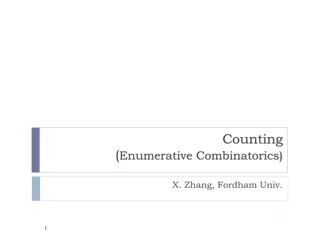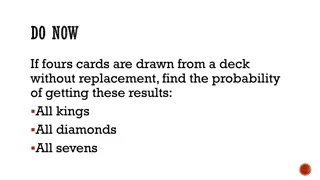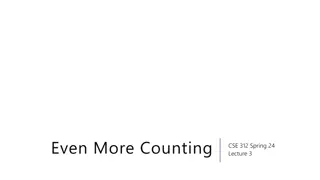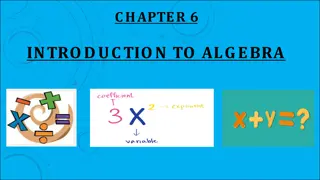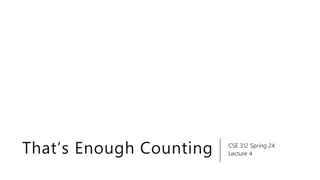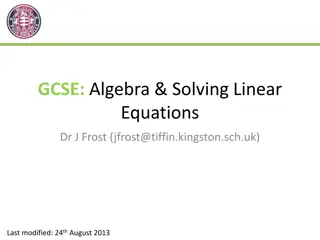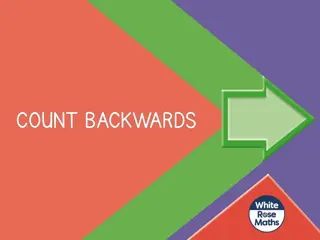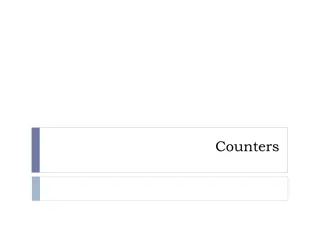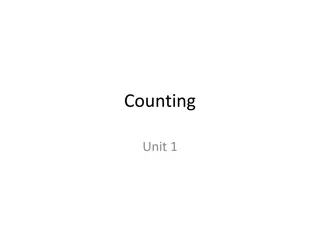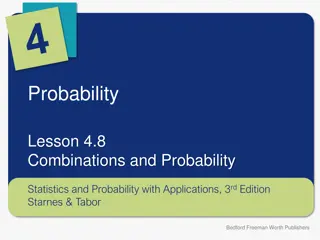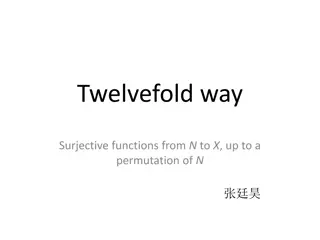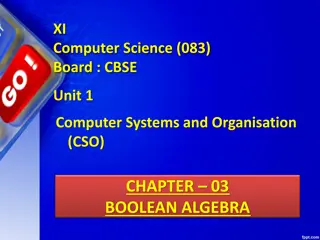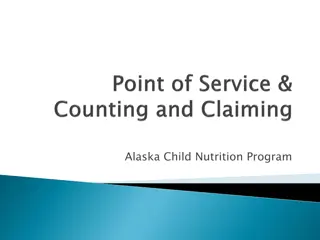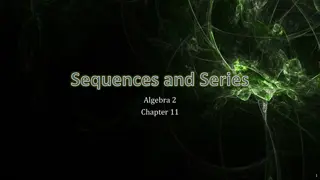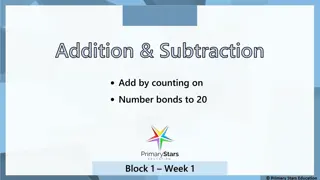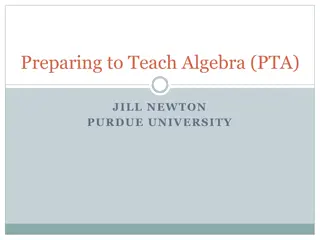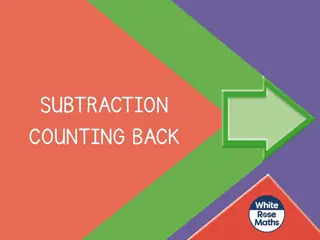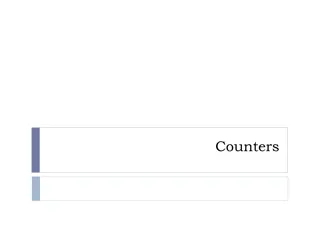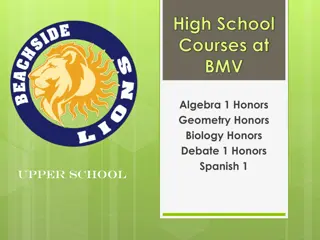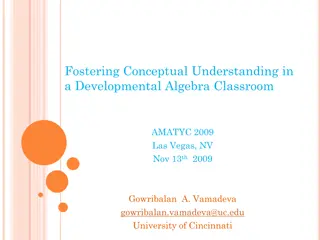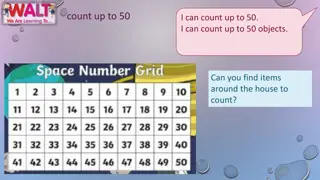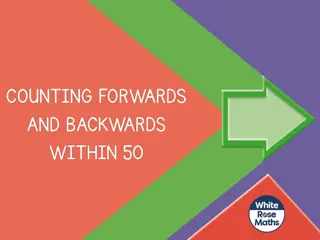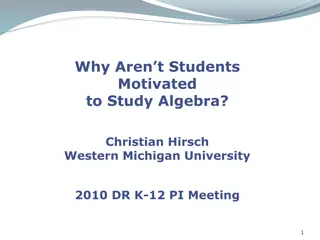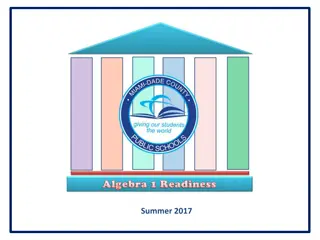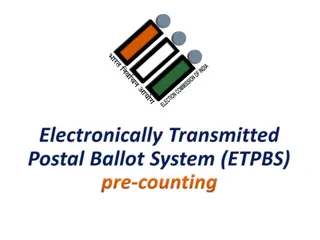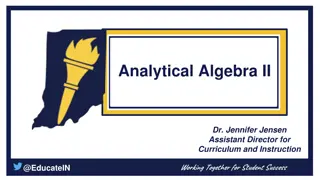Algebra 2 Chapter 10: Counting Principles and Permutations
Explore the fundamental counting principle and permutations in Algebra 2 Chapter 10. Understand how to calculate the number of ways events can happen and arrange objects. Learn about selecting ice cream sundaes, meal combinations, ordering objects, completing homework assignments, and reading book orders over the summer.
Download Presentation

Please find below an Image/Link to download the presentation.
The content on the website is provided AS IS for your information and personal use only. It may not be sold, licensed, or shared on other websites without obtaining consent from the author. Download presentation by click this link. If you encounter any issues during the download, it is possible that the publisher has removed the file from their server.
E N D
Presentation Transcript
Algebra 2 Chapter 10
This Slideshow was developed to accompany the textbook Larson Algebra 2 By Larson, R., Boswell, L., Kanold, T. D., & Stiff, L. 2011 Holt McDougal Some examples and diagrams are taken from the textbook. Slides created by Richard Wright, Andrews Academy rwright@andrews.edu
Lets say you stop to get an ice cream sundae You pick one each of Flavors: vanilla, chocolate, or strawberry Syrups: fudge or caramel Toppings: nuts or sprinkles How many different sundaes can you choose?
Nuts Fudge Sprinkles Vanilla Nuts Caramel Each sundae can have 3 flavors Each flavor can have 2 syrups Each syrup can have 2 toppings Sprinkles Nuts Fudge Sprinkles Sundaes Chocolate Nuts Caramel Sprinkles Nuts Fudge Sprinkles Strawberry 3 2 2 = 12 sundaes Nuts Caramel Sprinkles
Fundamental Counting Principle If there are multiple events, multiply the number of ways each event happens to get the total number of ways all the events can happen.
A restaurant offers 8 entrees, 2 salads, 12 drinks, and 6 desserts. How many meals if you choose 1 of each? How many different 7 digit phone numbers if the first digit cannot be 0 or 1?
Permutation How many ways to order objects A, B, C ABC, ACB, BAC, BCA, CAB, CBA 6 ways Number of Permutations of n objects taken r at a time ?! ???= ? ? ! Factorial (!) that number times all whole numbers less than it 5! = 5 4 3 2 1 = 120
You have 5 different homework assignments. How many different orders can you complete them all? How many different orders can you complete the first two?
There are 12 books to read over summer. How many orders to read 4 of them? How many orders to read all 12 books?
Permutations with Repetition ?! ?1! ?2! ?3! Where n is the number of objects and q is how many times each is repeated. How many ways to rearrange WATERFALL?
Combination Arranging of objects without order ?! ???= ? ? !?! Using a standard 52-card deck How many 7-card hands? How many 7-card flushes?
On vacation you can visit up to 5 cities and 7 attractions. How many combinations of 3 cities and 4 attractions? How many combinations to visit at least 8 locations?
A restaurant offers 6 salad toppings. On a deluxe salad, you can have up to 4 toppings. How many combinations?
Binomial Theorem (x + y)0 (x + y)1 (x + y)2 (x + y)3 (x + y)4 1x 1y 1 1x2 2xy 1y2 1x3 3x2y 3xy2 1y3 1x4 4x3y 6x2y2 4xy3 1y4
Binomial Theorem (a+b)n = nC0an-0b0 + nC1an-1b1 + + nCran-rbr ? ????? ??? = ?=0
Probability A number between 0 and 1 to indicate how likely something is to happen 0 = cannot happen 1 = always happens Theoretical Probability Number of ways A happens Total number of possible outcomes ? ? =
A spinner with 8 equal sections are numbered 1 to 8. Find P(6) P(n > 5) There are 9 students on a team. Names are drawn to determine order of play. What is the probability that 3 of the 5 seniors will be chosen last?
Experimental Probability Found by performing an experiment or survey Geometric Probability Probabilities found from picking random points from areas or lines
Find the probability that a random dart will hit the shaded area. 4
Odds When all outcomes are equally likely, the odds in favor of an event A is Number of outcomes in A Number of outcomes not in A Odds in favor of A = You can write odds as a ratio ? ? or ?:?
A card is randomly drawn from a standard deck. Find the indicated odds. In favor of drawing a heart Against drawing a queen
Lets say you have 1 event and you want one of two results to happen This is a compound event There may be some intersections where one condition satisfies both events so the events are overlapping If there is no intersection, then they are disjoint or mutually exclusive
P(A or B) = P(A) + P(B) P(A and B) A B If they are disjoint or mutually exclusive P(A and B) = 0
One D6 is rolled. What is the probability of rolling a multiple of 3 or 5? Two D6 are rolled. What is the probability of rolling a sum that is a multiple of 2 or 3?
In a poll of high school Jrs., 6 out of 15 took French and 11 out of 15 took math. 14 out of 15 took French or math. What is the probability that a student took both French and math?
Complements (A) All the outcomes not in A P(A) = 1 P(A) A card is randomly selected from a standard 52-card deck. Find P(not K) P(not (A or red))
Independent events 1 event has no effect on another event P(A and B) = P(A) P(B)
A game machine claims that 1 in every 15 wins. What is the probability that you win twice in a row? In a survey 9 out of 11 men and 4 out of 7 women said they were satisfied with a brand of orange juice. If the next 3 customers are 2 women and 1 man, what is the probability that all will be satisfied?
An auto repair company finds that 1 in 100 cars have to be returned for the same reason. If you take your car in 10 times, what is the probability that you will have the same thing fixed at least once.
Dependent Events Dependent 1 event affects the next Conditional Probability P(B|A) Probability that B occurs given that A already occurred P(A and B) = P(A) P(B|A)
You randomly draw 2 cards from a standard 52-card deck. Find the probability that the 1st card is a diamond and the 2nd is red if: You replace You don t replace
Three children have a choice of 12 summer camps. If they choose randomly, what is the probability that they choose different camps (it is possible to choose the same camp)?
In a town, 95% of students graduate HS. A study shows that at age 25, 81% of HS grads held full-time jobs while only 63% of those who did not graduate held full-time jobs. What is the probability that a randomly selected student will have a full-time job?
Construct Probability Distributions Make a table of all possible values of X and P(X) Use that data to draw a bar graph (histogram) A tetrahedral die has four sides numbered 1 through 4. Let X be a random variable that represents the sum when two such dice are rolled. 0.30 0.20 0.10 0.00 2 3 4 5 6 7 8
Binomial Distributions Two outcomes: Success or failure Independent trials (n) Probability for success is the same for each trial (p) P(k successes) = nCk pk (1-p)n-k
At college, 53% of students receive financial aid. In a random group of 9 students, what is the probability that exactly 5 of them receive financial aid?
Draw a histogram of binomial distribution of students in example 1 and find the probability of fewer than 3 students receiving financial aid. 0.3 0.2 0.1 0 0 1 2 3 4 5 6 7 8 9
